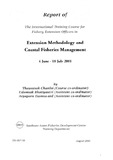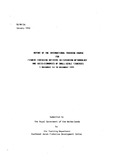Report of the International Training Course for Fishery Extension Officers in Extension Methodology and Coastal Fisheries Management
Share
| dc.contributor.author | Chanloi, Thaweesak | |
| dc.contributor.author | Bhatiyasevi, Udomsak | |
| dc.contributor.author | Eiamsa-ard, Arpaporn | |
| dc.date.accessioned | 2018-03-12T03:56:00Z | |
| dc.date.available | 2018-03-12T03:56:00Z | |
| dc.date.issued | 2001-08 | |
| dc.identifier.uri | http://hdl.handle.net/20.500.12067/308 | |
| dc.description.abstract | The primary aim of fisheries extension is to encourage groups of small-scale fisherfolk and rural fishing communities into sustainable and peaceful co-existance with their fisheries. There are several ways of to strengthen the extension service systems, which are designed to transfer technology to the fishermen, toimprove their awareness of their ecological responsibilities and to raise their socio-economic status and living conditions. It is evident that, at present, most extension service systems are inadequate for these purposes and must be improved. To upgrade these regional systems, several problems must be overcome. One problem is that officers employed for this task lack the skills to communicate, disseminate and demonstrate the necessary information. This situation would be improved if innovative training on communication anddissemination techniques, and extension methodology were given. | en |
| dc.language.iso | en | en |
| dc.publisher | Training Department, Southeast Asian Fisheries Development Center | en |
| dc.subject | Fishery Extension | en |
| dc.subject | report | en |
| dc.subject | training | en |
| dc.subject | Extension Methodology | en |
| dc.subject | Fisheries Management | en |
| dc.title | Report of the International Training Course for Fishery Extension Officers in Extension Methodology and Coastal Fisheries Management | en |




